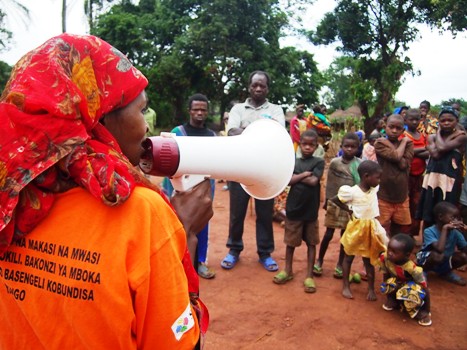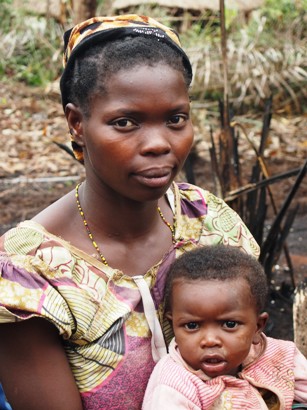Renewed military action against the Lord's Resistance Army (LRA) risks triggering further devastation for local people in DR of Congo, Central African Republic and South Sudan unless more is done to protect civilians and prevent LRA's retaliations. The warning comes on the day the San Diego-based group Invisible Children is due to have a day of action to bring awareness on one of Africa's most brutal rebel groups by 'making famous' worldwide its brutal leader, Joseph Kony.
As unprecedented global attention on the LRA builds and the African Union-United Nations joint force prepares to launch a new 5,000-strong military offensive, people living in LRA areas increasingly fear the repercussions for remote communities in central Africa. The charities, including Oxfam and Conciliation Resources, have called on UN peacekeepers to strengthen their protection of civilians, while also addressing the root causes of the conflict.
Previous attempts to combat the LRA militarily have not solved the problem of the LRA and have had a devastating impact on local people, prompting retaliations against civilians and dispersing the rebels across a much larger area, to target yet more isolated villages.

Awareness raising exercise held by members of the local protection committee and women's association in Bangadi village. Credit: Caroline Gluck / Oxfam
Organizations working with local communities say people in DRC, CAR and South Sudan continue to live in fear for their lives. In the first three months of 2012 the UN have recorded 33 attacks in two districts of DRC, with three people killed, 16 children and 35 adults abducted.
Local organizations working in affected areas warn the number of deaths and abductions is likely to increase once the joint operation is launched.
"We really question how any military intervention now will help to protect all these people against retaliation attacks from the LRA," said Ernest Sugule, president of Congolese organization SAIPD. "The LRA is a guerrilla group mainly comprised of ruthless commanders and forcibly abducted children. The new military offensive cannot discriminate between combatants and non-combatants and will only result in further loss of innocent lives."
Aid agencies are concerned that without better civilian protection, and in the wake of renewed violence, the number of people forced to flee their homes in the region could escalate above the current 440,000.

Antoinette, 38, sits with her youngest child, Tiingbagbe, a boy. She had fled her village of Nangwakaza when reports of LRA men approaching came. Credit: Caroline Gluck / Oxfam
"Millions of people across central Africa are living in constant fear of attack," said Olivia Kalis Oxfam's head of policy in Congo. "Psychological trauma and years of fear make many too afraid to farm, go to school or travel to market. Even small incidents or LRA sightings cause people to flee. Providing better security to remote villages will not only make people safer, it will help reduce the humanitarian and long-term effects of the conflict."
The agencies also called on UN peacekeeping forces to actively patrol areas at risk of attack and to strengthen its work encouraging rebels to defect from the LRA, a strategy which has been shown to work and is repeatedly cited by local communities as a key solution to the conflict. Any strategy in the region should include the view of the affected communities, more particularly women who are the primary victims of the conflict.
Over the long-term, communities need accountable, trained and equipped national security, the organizations said. Human rights abuses have been perpetrated not just by the LRA, but also by armies in the region. Preventing violence against the local population means a commitment to army reform, more accountability toward affected communities and development of isolated areas.
--------------------------------
* The 10 agencies are made up of six local organizations; three from DRC: Justice, Peace and Reconciliation Commission (CDJP-R), Aru-Faradje; Solidarity and Integrated Assistance to Vulnerable Populations (SAIPD), Network of Women Organisations in the Ueles (ROFU). One from South Sudan: Interchurch Peace Committee (ICC) and two from Uganda: Justice and Peace Commission (JPC) and Acholi Religious Leaders Peace Initiative (ARPLI). The international organizations are Cafod, Christian Aid, Conciliation Resources, and Oxfam.
* Over the past 25 years, the LRA has killed more than 100,000, abducted 70,000 and forced more than two million people from their homes and villages across four countries.
* In 2011, Oxfam conducted a survey in the LRA affected areas of Congo. In seven out of nine communities surveyed, people said UN peacekeepers were not patrolling enough in the most important places, such as in fields and roads to markets.
* The RTF will comprise 5,000 soldiers drawn from the four countries affected by the LRA -- Uganda, DRC, CAR and South Sudan. The task force has set up its headquarters in Yambio, South Sudan. It will have bases in Dungu, Obo and Nzara, South Sudan.